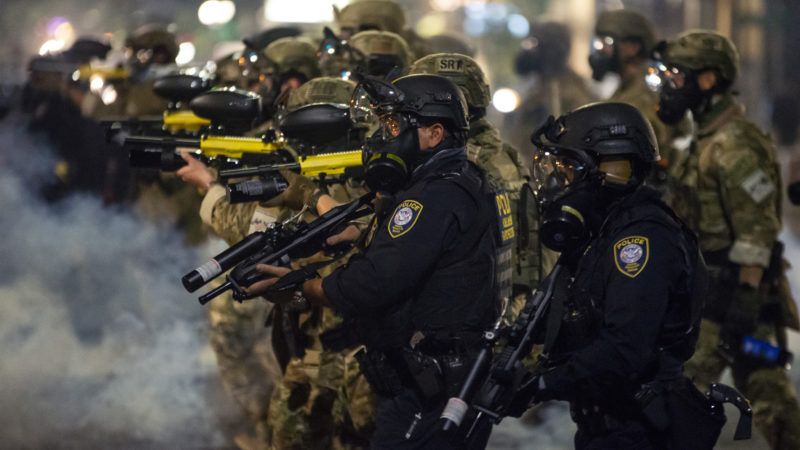Rand Paul: It's Time To Demilitarize the Police
The line between peace officer and soldier of war has become far too blurry.

In a free society, citizens should be able to easily distinguish between civilian law enforcement tasked with keeping the peace in our communities and the armed forces tasked with protecting our country from foreign adversaries.
Unfortunately, thanks to the federal government flooding our neighborhoods with billions of dollars of military equipment and property over the years, the line between peace officer and soldier of war has become increasingly blurry.
Police officers have an incredibly difficult and often thankless job where they lay their lives on the line every day. Without the rule of law, a civilized society cannot exist, and our officers deserve our gratitude. The horrific actions of a few bad actors should not erase all the good done by the vast majority of these brave and hardworking men and women.
But as the federal government has enabled our local police to become more and more militarized, it has placed them in greater danger by eroding the community trust crucial to doing their jobs well.
While I respect the determination to preserve law and order, sending in federal forces to quell civil unrest in Portland further distorts the boundaries, results in more aggression (including pepper-spraying and repeatedly striking a Navy veteran whose injured hand will need surgery), and has led to reports we should never hear in a free country: federal officials, dressed in camouflage, snatching protesters away in unmarked vehicles.
Sending the feds into Chicago won't make the situation there any better, either.
Nothing you'll read here excuses the actions of those who have destroyed lives and property in a mockery of peaceful protest—actions I have condemned. But many of us have been inspired by seeing protesters confronting these rioters, making the difference between righteous cause and opportunistic destruction even more stark.
Restoring lost trust is essential to reducing the tension and returning to peace. This means stopping the federal militarization of our local law enforcement and keeping federal agents and troops on the national posts where they best serve our country.
According to the Defense Logistics Agency (DLA), which operates within the Department of Defense, "More than $7.4 billion worth of property" has been transferred to law enforcement through the Law Enforcement Support Office (LESO) program. DLA also reveals that "as of June 2020, there are around 8,200 federal, state and local law enforcement agencies from 49 states and four U.S. territories participating in the program."
Back in 2014, NPR reported the federal government had sent out 79,288 assault rifles, 205 grenade launchers, and 11,959 bayonets from 2006–2014.
Yahoo recently reported that "the California Highway Patrol received what appeared to be a drone worth $22 million in 2016. The Howell Township Police Department in New Jersey received an MRAP [mine-resistant, ambush-protected vehicle] worth $865,000 in 2016. An MRAP provided to the Payne County Sheriff Office in Stillwater, Oklahoma, cost $1.3 million."
As the Senate debates the latest National Defense Authorization Act, I joined a bipartisan group of senators to introduce an amendment based on my Stop Militarizing Law Enforcement Act, which I originally introduced with Sen. Brian Schatz (D–Hawaii) in 2015 and have reintroduced in each session of Congress since.
Our amendment would have limited the transfer of certain offensive military equipment including bayonets, grenade launchers, and weaponized drones—all without prohibiting the continued distribution of defensive equipment, such as body armor.
It would also have ensured that communities are notified of requests and transfers by posted notices throughout the area and on a public website, and it would have required that a jurisdiction's governing body approves of the transfers.
Though the Senate voted against these common-sense changes, my standalone legislation goes even further to reform the system, and I will keep working to advance it through Congress.
Our bipartisan approach takes seriously the idea that cops on the beat can only do their jobs well when they are well-known by their neighbors and trusted by their communities.
The Stop Militarizing Law Enforcement Act will help build that relationship, making our citizens, police, and neighborhoods safer.

Show Comments (125)